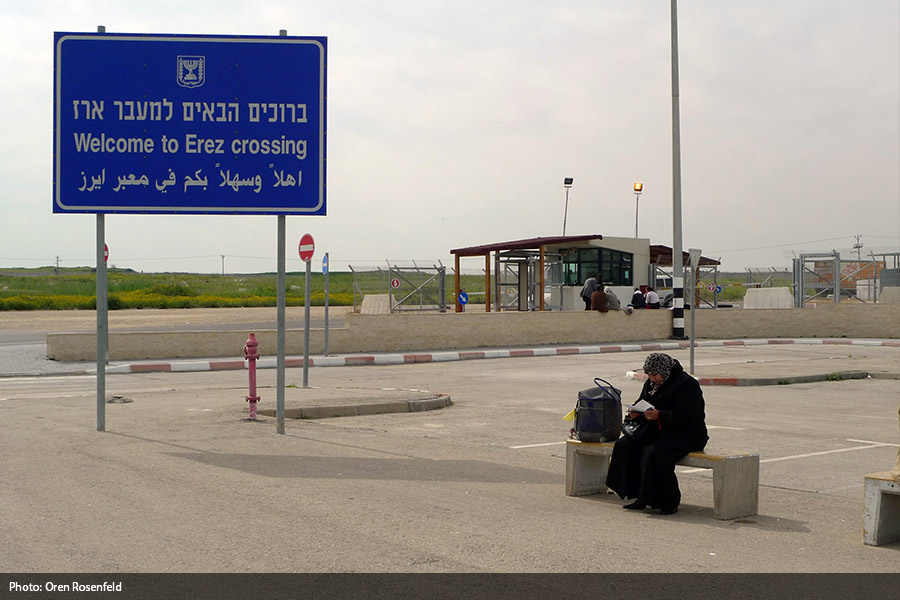
Dear friends,
For nearly two decades, Israel has imposed harsh restrictions on movement in and out of the Gaza Strip, dividing thousands of Palestinian families between Gaza and the West Bank, East Jerusalem, or Israel. These families face the harsh reality of lengthy and sometimes permanent separation, and their plight has recently been further exacerbated by Coronavirus restrictions.
Each year, HaMoked helps some 200 individuals or families receive the necessary permits to visit their loved ones in Gaza. The following are some of the cases we have been working on:
Till Death Do Us Part: When Nura* married a man from East Jerusalem in 1989, she didn’t realize this would mean separation from her siblings and parents for most of her adult life. Originally from Gaza, Nura moved to Jerusalem and started a family with her husband. Movement between Gaza and Jerusalem was then unrestricted, and Nura was able to visit her family regularly. But for at least the past 12 years, she has been unable to see her five siblings and parents. She first contacted HaMoked in 2009, asking us to help her get a permit to visit her sick father in Gaza. Time and again the military rejected Nura’s requests, stating they do not meet the “humanitarian” criteria for entry to Gaza. Sadly, in December 2020, Nura’s father passed away. HaMoked urgently requested that the military allow her to enter Gaza and grieve with her family. The military denied Nura’s request “due to the Coronavirus pandemic”, even though she was willing to undergo any required quarantine periods before or after seeing her family. Only after we urgently petitioned the High Court of Justice did the military grant Nura a permit to enter Gaza, where she had a bittersweet reunion with her mother and siblings after 12 years of separation.
All Grown Up: Heba always knew that after she turned 18, she would no longer be able to regularly see her father. Her father is a resident of Gaza and her mother is an Israeli citizen. Israeli policy bars the father from living in Israel, and the dire humanitarian crisis in Gaza has compelled Heba’s mother to raise the couple’s children in Israel, like many in their situation choose to do. The only way the family can spend time together is through visits to Gaza, under the strict criteria of Israel’s “divided families” policy. Once a child turns 18, they are no longer entitled to these routine visits. In December 2020, almost a month before Heba’s 18th birthday, HaMoked applied for a permit for her to visit her father in Gaza one last time. We received no response from the military until we threatened to submit an urgent court petition in the case. Two days after her 18th birthday, the military informed us that Heba’s request was refused because she was now an adult. We are currently drafting a court petition on Heba's behalf, and the stakes could not be higher; if our petition is unsuccessful, Heba may never have the opportunity to see her father again.
No Family Connection: What happens when a “divided couple” gets divorced? Ahmed is a resident of Gaza, and his ex-wife Lama is a citizen of Israel. Before the couple divorced, they had two children together, who are now 10 and 4 years old. On several previous occasions, HaMoked applied for permits for Lama, and she took her children to visit their father in Gaza. But the military denied our most recent permit request, saying Lama has “no family connection” to a resident of Gaza, and clarifying that we can submit a new request on behalf of the two children for an “extraordinary permit of entry without an accompanying parent”. HaMoked recently petitioned the HCJ to challenge the preposterous assertion that a 4 and 10-year-old must travel without their mother to visit their father in Gaza.
We are proud of our efforts to enable these separated families to meet, albeit rarely. At the same time, we know that these families will only fully enjoy their rights to freedom of movement and family life when Israel ends its illegal and immoral closure of the Gaza Strip.

Jessica Montell
Executive Director of HaMoked
*All names were changed to protect the privacy of our beneficiaries.

Subscribe




